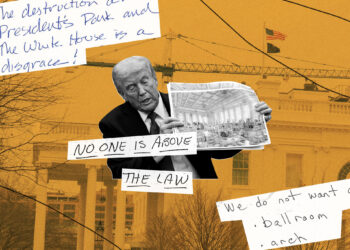Thousands of public comments slam Trump’s ballroom: ‘I did not vote for this’
President Donald Trump has spent months touting his planned White House ballroom, but this week the public gets its first...
Americans stranded in the Middle East say they’ve had little US government help: ‘I felt betrayed and left out to dry’
Ryan Lim / AFP via Getty ImagesThe US government has told citizens in parts of the Middle East to depart...
A Political Earthquake Rattles the North Carolina Legislature
The American flag cake was about half eaten by the time Phil Berger, North Carolina’s most powerful legislator, stepped to...
Desperate Planned Parenthood now selling Botox, lip fillers and laughing gas to make cash after Trump slashed funding by $100M
They sell Botox, lip filler and laughing gas. No — a new beauty-centric dentist hasn’t opened up in California’s State...
With Iran, international law has lost its credibility
Julian Ku is professor of constitutional law at Hofstra University. When Yale law professor Oona Hathaway calls U.S. strikes on...
How $800 Monthly Car Payments Are Hurting Car Sales
Buying a new car has become unaffordable for a growing number of Americans — and that is starting to become...
CBS News, the Free Press Hires Aaron MacLean as National Security Analyst
CBS News and the Free Press said on Thursday that Aaron MacLean will join the Bari Weiss-led news organizations as...
Israeli Evacuation Orders Spark Panic in Beirut
The streets of Beirut erupted in chaos on Thursday after the Israeli military ordered people to flee the southern suburbs...
Lack of ‘clean kills’ for Trump has Bondi on the hot seat as MAGA lawmakers rebel: MS NOW
Attorney General Pam Bondi is caught in a bind because her Department of Justice has failed to successfully wage war...
How Older Adults Are Improving Their ‘Sex Span’
For most of their eight-year relationship, Joan Price and her boyfriend, Mac Marshall, have scheduled weekly sex dates. The pair...














